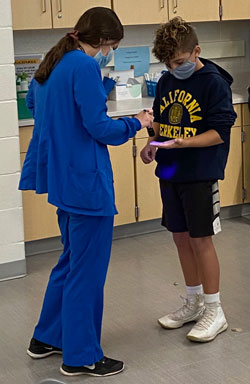Kenowa Hills — At the beginning of the school year, Quinn McGill made the transition from working at Metro Health Hospital’s emergency room to working as a full-time school nurse at Kenowa Hills High School.
She recently reflected on the lessons she’s learned.
“While working in the high school, you do your best to adapt to change and adjust to new health and safety regulations and protocols,” she said. “I always try to keep a good attitude, no matter if I fail and or succeed.”
District nurses learned alongside administrators, teachers and students amid the challenges of a pandemic.
“It’s a learning curve, and cases would come in waves throughout the year,” McGill said.
Between health screenings, contact tracing, paperwork and the day-to-day monitoring of the physical and mental health of staff and students, nurses stayed busy as their positions evolved.
“It’s a lot, but it’s a lot for the kids, and you feel bad sometimes,” she said. “Some kids had to quarantine multiple times, which throws a wrench in their classroom learning and their parents’ plans.”

One of the biggest challenges McGill said she faced in her role was keeping up with contact tracing and evolving state health orders, especially those issued in May, near the end of the school year.
“In a matter of days different orders have come out from the state and it’s our job to communicate and implement them in the schools,” McGill said. “Everything changed so close to the end of the year about what’s required for masks that it took patience working with administration for the end of the year plan.”
Zinser Elementary nurse Courtney Ellens said she spent the majority of the year focused on coronavirus mitigation strategies.
“The biggest challenge this year was starting in a position that was completely new to the school,” Ellens said. “We were given guidelines to follow, but ultimately had to shape the position and our daily routine into what worked best for the staff and students.”
As case numbers decreased, Ellens worked with individual students and took on a more typical school nursing role.
“Elementary school-age kids are so fun to work with, but when they are not feeling well, it is sometimes hard for them to express what is wrong,” she said. “You really have to get to know the kids and be able to dig a little deeper into the problem.”

Kenowa Hills Middle School Principal Abby Wiseman said “in many ways, it was life changing to have the nurses in schools. We had great nurses out in the halls and getting to know kids, which provided another safe person for students and staff to go to for help.”
She also credits school nurses being available to teachers and students as one of the major reasons the district maintained in-person learning to some degree all year.
“We don’t realize how much we ask of our front office secretaries, and we’re not medical professionals,” Wiseman said. “Families could also call with symptoms or questions and our nurses gave answers and medical advice during a time of uncertainty. … They helped ease some anxieties for staff and students, allowed us to create collaborative relationships with families about their students and facilitate health and safety conversations with the community.”
According to Wiseman, the school nurses and families forged a bond over caring for their students’ health and their ability to learn in the classroom.
In a June 4 message from Superintendent Jerry Hopkins, he told families he felt “hopeful and optimistic for a much more normal 2021-22 school year.”
McGill said the district will maintain all eight school nurse positions and is even looking to expand their roles.










